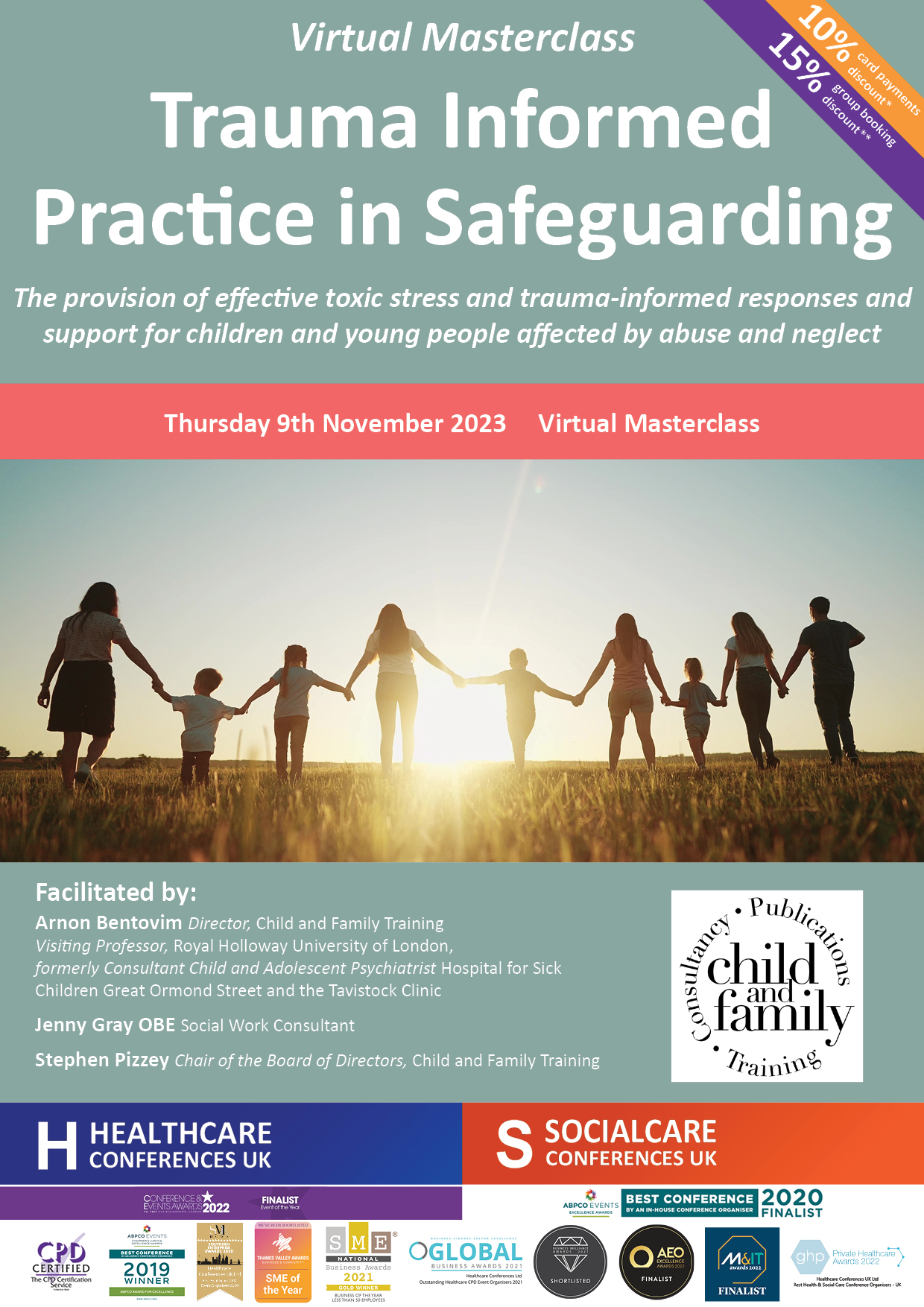This masterclass will take a modular multi-focal approach to promote resilience and recovery of children and young people when there are safeguarding concerns.
Hilary Garratt, the Deputy Chief Nursing Officer writes in the Annual Safeguarding report that
‘This year we’ve seen a sharp increase in reports of domestic violence, serious violence, and we have seen exploitation in many other forms, including online grooming, scams, frauds, adult abuse, family poverty, mental health issues, and all the consequences that those things bring for families and communities. Evidence tells us that adverse experience, especially in childhood, is a form of trauma. If it’s not recognised and dealt with, it can often lead to the perpetuation of vulnerabilities, which can often lead to exploitation, violent behaviour, and abuse'
Prof Mark Bellis in a recent WHO report states that
‘An understanding of the impact of adversity allows multiple sectors and agencies to recognise that the issues they see in people’s lives, whether health, education, social or criminal justice related, are often rooted in the same childhood adversities – forms of maltreatment, and the associated household stressors – parental mental health, substance abuse, and violence, and the resulting toxic stress responses. Toxic stress responses have long standing effects on emotional and behavioural development, associated with life-long impacts on adult health and parenting affecting the next generation.’
Trauma informed practice needs to provide an effective toxic stress and trauma-informed response including an awareness of how trauma impacts individuals, families and organisations; the need for trustworthiness, peer support, and collaboration with those who have lived experiences of trauma; shared power and decision-making; an input responsive to racial ethnic and cultural needs of different individuals.
An effective evidence-based modular multi-focal trauma informed model of intervention, The Hope for Children and Families Intervention Resources (Bentovim and and Gray (eds), 2016; 2017) provides a ‘library’ of resources which can be accessed and integrated to meet the complex pattern of responses and needs identified when there are safeguarding concerns.
Modular Common Practice Elements - are therapeutic procedures derived from a variety of sources including singlefocus intervention manuals targeting mental health and developmental problems (Chorpita and Daleiden, 2009). The modular HfCF includes Common Practice Elements (CPE) derived from interventions to address the toxic traumatic responses associated with different forms of maltreatment (Bentovim and Elliott, 2014). CPE are integrated into modules, with relevant theory and research, and a stepwise approach to intervention with scripts, guidance notes, hand-outs, and activities was introduced that can be used by a wide range of practitioners. (Bentovim and Gray, 2016, 2017).
Modules to promote Engagement and goal setting (Bentovim et al., 2017) include constructing a profile of the child, parent and families’ strengths and difficulties, children’s developmental needs, parenting capacity, and family and environmental factors.
Two guides focus on working with children and young people:
- Addressing emotional and traumatic responses, addresses the direct impact of abuse and neglect,: including constructing a trauma narrative (Weeramanthri, 2016);
- Working with children and young people: Addressing disruptive behaviour (Eldridge, 2017); and, Working with child sexual abuse - including work with children subject to abuse and exploitation and sexually harmful behaviour (Eldridge, 2016).
Four intervention guides are focused on working with parents who have been responsible for abuse and neglect.
- Modifying abusive and neglectful parenting’ (Bentovim, 2017a)
- ‘Promoting positive parenting’ (Roberts, 2016); ‘Promoting attachment, attuned responsiveness, and positive emotional relationships’ (Gates and Peters, 2017); and,’
- Promoting children and young people’s health, development and well-being’ (Bentovim, 2017b).
Working with Families (Jolliffe, 2016) helps practitioners work with parents/caregivers and children together to promote communication, manage the conflict, and achieve stability.
Cohort training for services delivering a programme of workshops trains front-line professionals to deliver trauma informed practice.
Piloting and implementation in a variety of contexts demonstrated that practitioners at all levels of skills and experience across the field of health, education, social care and offending services could benefit and develop a trauma -informed approach to practice.
Key Learning Outcomes
This masterclass will enable you to:
- Access an updated account of current research on the spectrum of forms of maltreatment associated with safeguarding concerns, including an appreciation of current views on the range of adversity which affects children’s lives.
- Be informed about recent research on forms of parenting responsible for different forms of maltreatment, abuse and neglect, which results in toxic stress responses
- An updated account of stress responses resulting from – positive, tolerable and toxic stress and their ‘embedding ‘ in the biological system with short and longer term impacts
- A review of the assumptions, and principles of Trauma Informed Practice, and the evidence for the effectiveness of the approach
- A review of research on interventions to work with parents responsible for toxic stress responses in children and young people, and with children and young people.
- A review of research on the effectiveness of Trauma Based interventions to address the impact of toxic stress
- The basic research which demonstrates the effectiveness of modular treatment approaches, and development of a trauma informed approach
- Presenting the library of common practice elements, integrated into modules, and guides and demonstrating how they would apply in practice using a video case example, using assessment and analysis tools to underpin an intervention plan utilising selected modules from The Hope for Children and Families Intervention Resources
- Discussion of training and implementation of the approach across services.
Who Should Attend
Practitioners and their managers concerned with safeguarding across children’s services, the field of social care, health, education, and offending services.



